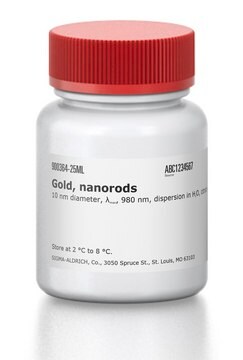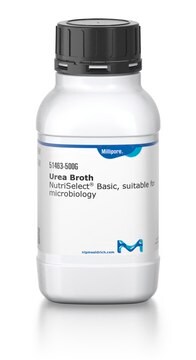776688
Gold nanorods
10 nm diameter, λ: 1064 nm Amax, dispersion in H2O
Synonym(s):
Au nanorod, gold nanorod, Au nanorods, Gold nanorod
About This Item
Recommended Products
form
colloidal suspension
dispersion in H2O
nanorod
Quality Level
contains
CTAB as stabilizer
concentration
>30 μg/mL in H2O
diam. × L
10 nm × 67 nm (±10%)
diameter
10 nm
density
1.00 g/mL at 25 °C
Mw/Mn
<10 (CV, monodispesity)
storage temp.
2-8°C
SMILES string
[Au]
InChI
1S/Au
InChI key
PCHJSUWPFVWCPO-UHFFFAOYSA-N
Looking for similar products? Visit Product Comparison Guide
Related Categories
Application
Gold Nanostructures: Properties and Applications
Gold Nanostructures: Properties and Applications
Legal Information
Hazard Statements
Precautionary Statements
Hazard Classifications
Aquatic Chronic 3
WGK
WGK 3
Regulatory Listings
Regulatory Listings are mainly provided for chemical products. Only limited information can be provided here for non-chemical products. No entry means none of the components are listed. It is the user’s obligation to ensure the safe and legal use of the product.
JAN Code
776688-VAR:
776688-25ML:
776688-BULK:
Choose from one of the most recent versions:
Certificates of Analysis (COA)
Don't see the Right Version?
If you require a particular version, you can look up a specific certificate by the Lot or Batch number.
Already Own This Product?
Find documentation for the products that you have recently purchased in the Document Library.
Customers Also Viewed
Articles
Gold nanostructures such as nanorods, nanowires and microgold have found applications in exciting fields such as biomedical engineering, catalysis and diagnostics.
Silver nanomaterials have unique physical, chemical, and optical properties that are currently being leveraged for a wide variety of biological applications.
Among various ceramics, one-dimensional (1-D) piezoelectric ceramics have attracted significant scientific attention for use in energy harvesting.
Inorganic nanomaterials are tunable by size, shape, structure, and/or composition. Advances in the synthesis of well-defined nanomaterials have enabled control over their unique optical, electronic, and chemical properties stimulating tremendous interest across a wide range of disciplines. This article illuminates some of the recent research advances of inorganic nanoparticles (NPs) in optoelectronics applications.
Our team of scientists has experience in all areas of research including Life Science, Material Science, Chemical Synthesis, Chromatography, Analytical and many others.
Contact Technical Service







